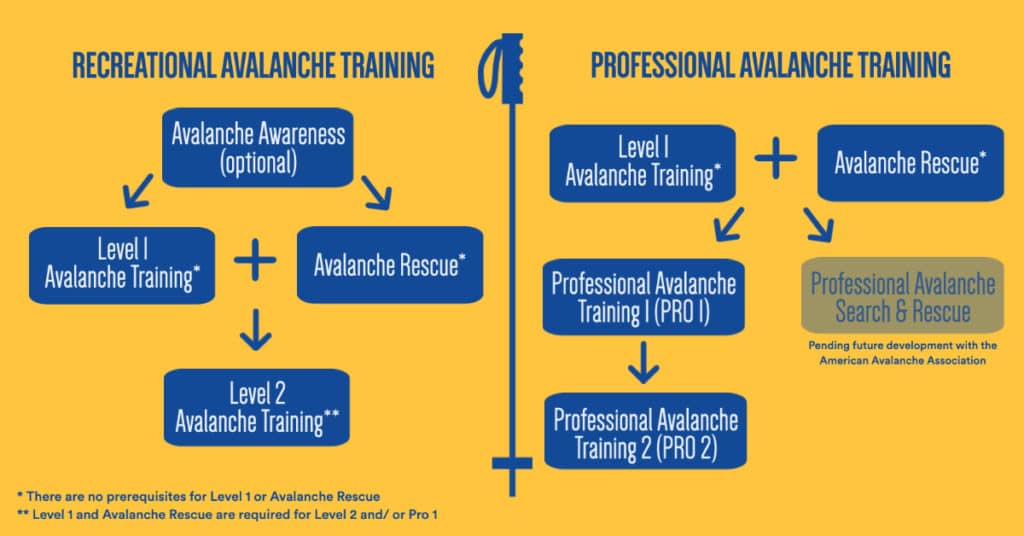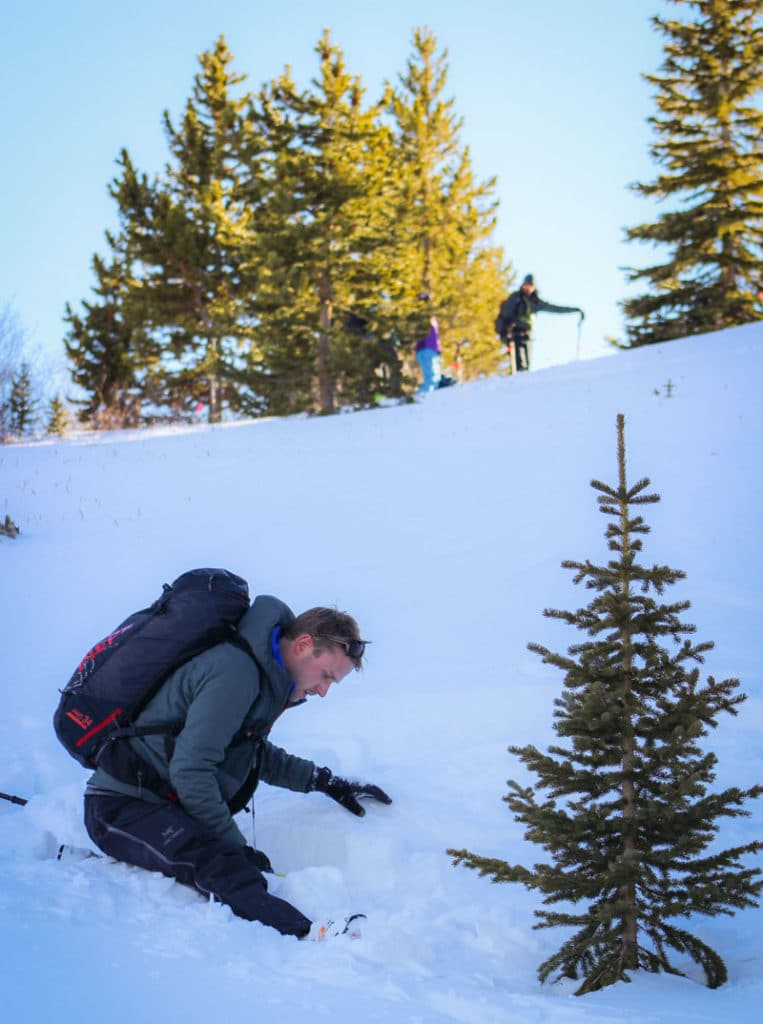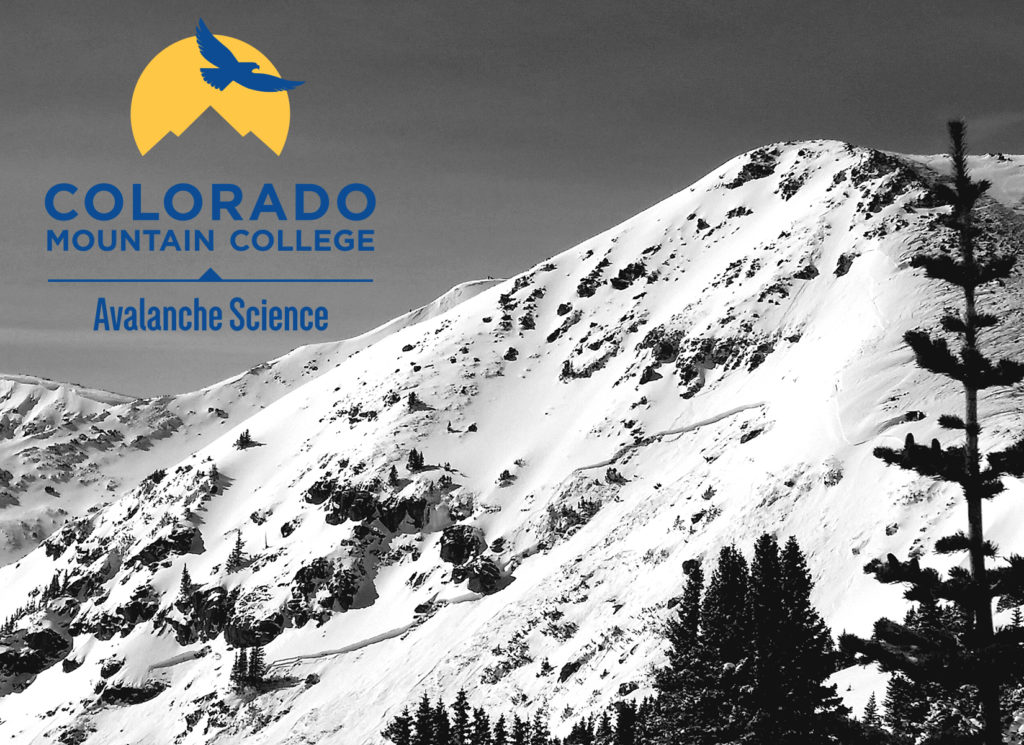Avalanche Training Today: The Professional/ Recreational Split
Anyone interested in exploring the backcountry should seek out formal avalanche training. Whether you are skiing, snowboarding, snowmobiling, or simply hiking around some of your favorite trails it is important to have an understanding about avalanche safety, awareness, and emergency strategies.
When it comes to avalanche training, the number of options and course types can be overwhelming. This guide will explain the different paths of recreational and professional avalanche training courses to help you safely recreate in the backcountry this winter.
REC or PRO?
The REC track—short for recreation—is the starting point for recreationalist and professionals alike. Working professionals like ski patrollers or outdoor educators may be interested in continuing their education with PRO (professional) courses after completing REC courses.

Level 1 and Avalanche Rescue
Level 1 Avalanche Training
The Level 1 course, also known as Avy 1, is the starting point for recreationalists and aspiring professionals. The Avy 1 and Avalanche Rescue courses are the minimum training recommendation for anyone traveling in the backcountry. A Level 1 course is generally a 3-day course with a field component, where students begin to learn about avalanches and snowpack. You’ll study the basics about types of avalanches, and learn to identify hazardous terrain and avalanche conditions.
Most importantly, the Avy 1 course teaches students how to make educated decisions and have meaningful discussions about tour plans, risks, and mitigation. This course offers many opportunities to develop decision making skills in the backcountry and the field component allows students to make real world applications to class topics.
 Avalanche Rescue
Avalanche Rescue
The Avalanche Rescue course focuses on companion rescue and what to do if someone in your group gets caught in an avalanche.This is a 1- day course with a focus on how to properly use avalanche rescue equipment effectively and make educated decisions in the case of emergency.
There is the opportunity for a lot of hands on practice with companion rescue, avalanche beacon use, and other professional tips. The companion rescue course is a great class to retake every couple years to hone your skills and learn about changes within the industry.
Both Avy 1 and Avalanche Rescue courses have no prerequisites. Students are able to take one or the other in any order, but be aware that any higher level avalanche courses requires both the Level 1 and Avalanche Rescue.
Level 2 Avalanche Training
The Level 2 Avalanche course, also known as Avy 2, allows backcountry users to continue to build off of topics introduced during the level I and rescue courses. This is a great course for the more experienced recreationalist looking to get more tools for their backcountry tool kit.
This course expands on topics about decision making, risk and terrain management, and group travel. Avy 2 courses tend to be particularly fun because most of the participants are excited to dive further into topics and really work on developing their skills.
PRO 1
The professional level 1 course is now the baseline for avalanche professionals. The primary focus of the PRO 1 course is on safe travel, snow and weather observations, and time spent in snow pits. PRO 1 runs for 5 days with a 2 days of assessments. The structure of this course shifts away from the recreational perspective and focuses on professional level risk management, observations, and rescue skills. This is a course designed for aspiring forecasters, ski patrollers, and mountain guides.
PRO 2
The American Avalanche Association describes Professional Avalanche Training 2 (PRO 2) as designed for developing avalanche professionals with several seasons of applied professional experience as well as seasoned professionals who are looking to develop skills applicable to leadership roles within their operation.
The PRO 2 is for experienced workers who desire to continue to develop their forecasting, risk management, and leadership skills. Workers will analyze information from various sources and make operational decisions on multiple spatial and temporal scales.
This course contains a much heavier workload than previous courses and is targeted to those already well into their career as forecasters and snow safety professionals.
Free Avalanche Education Resources
There are many free resources for the aspiring avalanche safety student. These are not substitutes for professional training but it is a great place to start.
The Know Before You Go program is a resource offered by the Utah Avalanche Center and the Colorado Avalanche Information Center/ Friends of CAIC. This is a great introduction to avalanche safety and an alternative to attending a live session.
Avalanche.org provides avalanche forecasts from all across the country, but it has free tutorials and a useful course finding tab.
Many nonprofits and organizations, like Friends of the CAIC, Colorado Mountain School, REI and Ski-Doo, also offer free avalanche awareness seminars.
Most Importantly, remember to check local avalanche forecasts for the area you plan to recreate in. Most of these forecast centers also have climate specific educational resources.
- Colorado Avalanche Information Center
- Utah Avalanche Center
- Avalanche.org
- Crested Butte Avalanche Center
Course Providers
When considering avalanche training courses you will often see American Avalanche Association (A3) and AIARE (American Institute for Avalanche Research and Education). The American Avalanche Association is responsible for setting curriculum guidelines and AIARE uses those guidelines to develop courses and instructors. People often believe that AIARE is the only course provider but there are other providers that follow the A3 guidelines as well. Colorado Mountain College is an AIARE and A3 certified professional course provider!

Recreational and Professional Avalanche Training at Colorado Mountain College
Recreational Training
Colorado Mountain College offers both the recreational and professional tracks for avalanche training. Recreational backcountry users can begin their avalanche education with Level 1 Avalanche Training (OUT-168), Avalanche Rescue (OUT-268), and progress to Level 2 Avalanche Training (OUT-269).
Avalanche Science: Professional Avalanche Courses at Colorado Mountain College
Colorado Mountain College Leadville also offers professional level avalanche training and continued education for current or aspiring avalanche industry professionals. The Avalanche Science program is a two-year certification designed by industry experts from the Colorado Avalanche information Center, Colorado Mountain College, and U.S. Forest Service. Program graduates earn a Snow, Weather & Avalanche Field Technician certificate as well as an American Avalanche Association PRO certification.
Find a complete list of avalanche courses offered at CMC on the course catalog.



